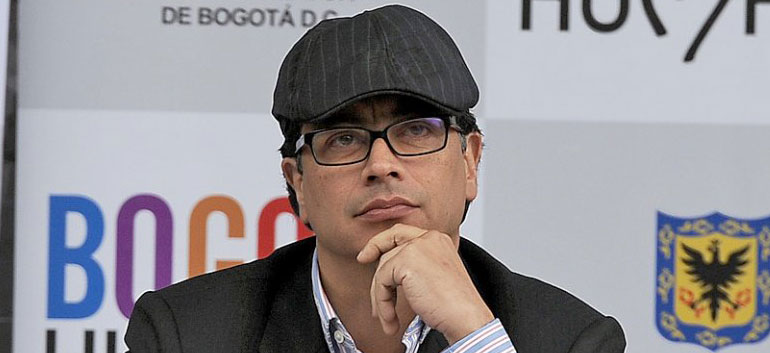Last year at this time, Bogota’s mayor Gustavo Petro’s popularity rating was abysmal. But while the former guerrilla turned leftist leader’s political future hangs in the balance following his dismissal by a government institution, a peculiar thing has happened; he is becoming a popular mayor.
Since mid-December, Colombia has had just one name on its lips: Gustavo Petro. This itself is not uncommon, for the Mayor of Colombia’s capital city of Bogota is one of the most high powered political offices in the country. However, what is uncommon is the meteoric rise in public perception of the former urban guerrilla member since Inspector General Alejandro Ordoñez ordered the mayor thrown out of office on December 9th over a trash collecting dispute.
MORE: Colombia’s Inspector General dismisses Bogota mayor over trash collecting scandal
And although few are arguing that the mayor was not responsible for the event in question that allegedly left 9,920 tons of uncollected garbage on the streets, the Inspector General’s attempt to dismiss Petro from his office has backfired. The leftist former congressman has been ascended from “another unpopular mayor for Colombia’s capital,” as deemed by the magazine The Economist, to a man whose announced dismissal caused thousands of supporters to take to the street in protest.
MORE: Pro-Petro marches mobilize hundreds in Colombia’s major cities
After Petro’s first year as mayor at the end of 2012 –post garbage pick-up debacle– his approval ratings sat at a steady 32%. In the same year there was even a mandate asking to recall the election that put him in office: 78% of Colombians supported the recall, according to newspaper El Tiempo.
Heading toward December 2013, polls asking if citizens had a positive image of the Bogotano mayor still could not break 50%.
However halfway through January 2014, after the initial dismissal, appeals, rejected appeals, court rejections of rejections, and Petro’s job still being in limbo, Colombians have turned their once unpopular mayor into a political martyr.
MORE: Dismissal of Bogota Mayor upheld by Inspector General’s Office
MORE: Court suspends dismissal of Bogota mayor
News outlet CM& released a poll late Wednesday night illustrating that 73% of Bogota’s citizens disagreed with the Inspector General’s sanction of Petro, which dismissed him from office and banned his participation in public politics for the next 15 years. Only 26% of voters supported the decision.
Meanwhile, another poll, conducted across 13 Colombian cities by El Tiempo with radio station La W Radio, showed that just 25.7% of people supported the dismissal of Bogota’s mayor, while nearly 50% were in disagreement.
To many of the Pro-Petro supporters, the politician has now become a symbol of democracy fighting in the face of an overreaching government.
Since his dismissal, the mayor’s popularity rating has risen substantially from 30% to 52% approval rating, while the Inspector General’s rejection rate has reached 56 percent.
Ordoñez, who heads the Inspector General’s Office — a Colombian institution charged with exercising authority over public officials –, is a polemic political figure in Colombia due to his radical conservative politics based on a strict reading of the Catholic faith.
MORE: Outcry continues as dismissed Bogota mayor’s supporters rally
While this scandal might cripple Petro’s long-term political career, there is no doubt that the public’s overall opinion of the former guerrilla has made a remarkable upswing in just one year.
This feud can still go either way, but it is clear that if Petro is ultimately forced to step down, he will be remembered by many not for leaving his city filled with garbage for a few days, but rather for being the leftist politician who was unjustly persecuted by an overreaching government institution.
Colombia will continue to have its eyes on Bogota in the coming weeks.
Sources
- A load of rubbish (The Economist)
- Encuesta de Gallup: imagen de Santos cae al 21 por ciento (El Tiempo)
- Imagen de Gustavo Petro bajó (El Espectador)
- Crece imagen positiva del alcalde Gustavo Petro (El Espectador)
- Encuesta sobre sanción impuesta al alcalde Gustavo Petro (CM&)
- Encuestas respaldan a Gustavo Petro y rechazan fallo del Procurador (El Tiempo)



